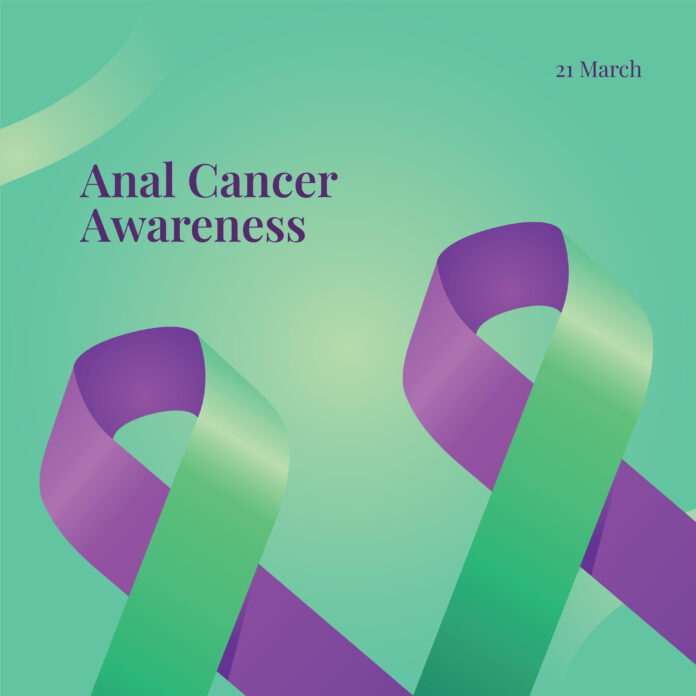By Christopher Wheldon
We’re all familiar with cancer awareness campaigns. You’ve probably seen the pink ribbons, or maybe you’ve raced for a cure or watched television advertisements for colon cancer screening. But if you are like most Americans, you’ve never heard of anal cancer (although it does have a ribbon!). It is time to change that.
March 21 is Anal Cancer Awareness Day. It is a perfect time to increase understanding about anal cancer and its impact on those affected by the disease — particularly gay men — and to encourage people to talk openly about this often-stigmatized topic.
There are a few reasons for the lack of public awareness of anal cancer. For one, it is relatively rare in the general population, affecting about 2 out of 100,000 people. Farrah Fawcett, one of Charlie’s Angels, is probably the best-known celebrity to battle anal cancer, losing her fight in 2009.
Anal cancer also affects the “butthole” — a body part most people aren’t clamoring to talk about. But colorectal cancer isn’t that far away from the anus, and it gets plenty of attention. In fact, Temple Health gives tours of the inside of a giant inflatable colon to raise awareness about that disease.
Another, more flagrant reason might be because the primary cause of anal cancer is a sexually transmitted infection. Over 90% of anal cancers are caused by human papillomavirus (HPV) — the most common viral sexually transmitted infection in the U.S. Again, not a topic that frequently comes up in conversation.
HPV causes other cancers as well, with cervical cancer being the best known. But unlike cervical cancer, which has been decreasing in the U.S., the rate of anal cancer is steadily increasing. Gay men and other men who have sex with men are bearing the disproportionate burden of this disease. The stigma surrounding anal sex and the lack of awareness about anal cancer have contributed to the neglect of this issue.
The odds of a gay man developing anal cancer are about 20 to 80 times higher than for a heterosexual man. This makes anal cancer one of the most common cancers affecting gay men. The risk of anal cancer is even higher among people living with HIV. This is all because of HPV. Having receptive anal sex increases your risk of an anal HPV infection. And living with HIV makes it harder for your immune system to get rid of harmful HPV infections.
But there is good news. HPV vaccination can prevent anal cancer. The current HPV vaccine is approved for everyone between the ages of 9 and 45. This vaccine works best before you are exposed to HPV, so that is why it’s highly recommended for adolescents. But there is no reason why sexually active adults cannot get vaccinated.
The other good news is that there are ways to screen for anal cancer. However, there are no national guidelines about who should be screened, when they should be screened, and at what frequency. A recent study published in the New England Journal of Medicine clearly demonstrated that it is possible to diagnose and treat abnormal cells in the anal canal before they can develop into cancer. This is very similar to how cervical cancer is prevented. In the absence of national guidelines, you can talk to a doctor to see if anal cancer screening is appropriate for you.
You should also be aware about the symptoms associated with anal cancer. Pain, bleeding, itching, and discharge in the anal area are possible symptoms but are also commonly caused by other conditions. That is why finding a healthcare provider who you feel comfortable talking to and who is knowledgeable about gay men’s health is so important. Early detection is key to successful anal cancer treatment.
The survival rate of people diagnosed with anal cancer at an early stage is over 80%. Unfortunately, signs of anal cancer are frequently attributed to benign issues like hemorrhoids. If you are experiencing symptoms and have other risk factors for anal cancer, you may need to advocate for your own health. Your healthcare provider should be performing a digital anal rectal exam. That means they will insert their finger about an inch into your “butthole” to feel for abnormalities. It is a quick and painless procedure that may save your life.
We also need to start talking about anal cancer and advocating for more research and resources to prevent and treat this disease. The Anal Cancer Foundation is currently leading this effort, so if you want to learn more go to their website. We can do our part by getting vaccinated against HPV and talking to a healthcare provider about the potential benefits of anal cancer screening. By breaking the taboo about this topic, we can save lives and improve the health of our community.
Christopher Wheldon is Director of CHEER Lab and Assistant Professor of Public Health at Temple University.
